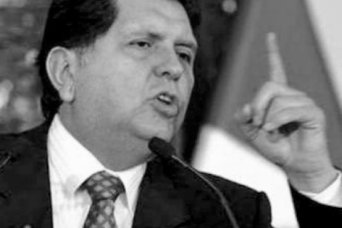- About
- Topics
- Picks
- Audio
- Story
- In-Depth
- Opinion
- News
- Donate
-
Signup for our newsletterOur Editors' Best Picks.Send
Read, Debate: Engage.
The Peruvian former President Alan García shot himself earlier this week when the police came to his house to arrest him for corruption. He was accused of bribery during his second term in office between 2006 and 2011. García was one of the four former Presidents and other high officials facing allegations of corruption and money laundering in Peru.
Investigators suspected García of being bribed by the Brazilian construction company Odebrecht that wanted a contract to build a new subway system in Lima. The Ex-President denied the accusations, including on Twitter a day before he killed himself.
Approximately one week before García committed suicide, Peruvian police had detained another former President, Pedro Pablo Kuczynski (in office 2016 - 2018). According to Deutsche Welle, prosecutors are investigating payments of more than $780,000 made to Kuczynski's consulting firm, again by Odebrecht.
Ollanta Humala, who was the Peruvian President after Alan García and before Kuczynski, was arrested in July 2017. Alejandro Toledo (in office from 2001 - 2006) is currently a fugitive in the North Ameria.
All the recent Presidents in office since 2001 are accused of being corrupted by Odebrecht, a company that is involved in the construction of the biggest infrastructure projects in the region. Odebrecht also has projects in Mozambique and Angola. In 2014, it became famous for another reason—being involved in one of the biggest money laundering scandals in the world, operation Lava Jato.
According to the BBC, since the group's chief executive, Marcelo Odebrecht, was arrested in 2015, a dozen of other company executives have been jailed. A year later, they signed deals with Brazilian investigators, agreeing to confess to crimes and to identify corrupt officials in exchange for shorter prison sentences. These plea deals are one of the anti-corruption measures that can help prosecutors unveil corrupted officials across Latin America, as long as those arrested do not only use them to shorten their sentences.
The company admitted to paying bribes to high officials in more than half of Latin American countries. In Peru, Odebrecht has paid almost $30 million in bribes since 2004.
In the Corruption Perceptions Index 2018, which scores countries based on how corrupt their public sectors are seen to be, Peru ranked 105 out of 180 states. It dropped down to 35 points out of 100 (where 0 means highly corrupt and 100 means very clear), which is below the America's average of 44. For example, Ecuador and El Salvador scored 34 and 35 points respectively, which is two points more than a year ago.
Their justice sectors are also investigating officials, including some former Presidents, for corruption. However, Transparency International, the author organisation of the Index, urges a need to strengthen the independence of their judiciary systems to ensure impartial prosecutions, and to punish appropriately those who are found guilty. Overall, Transparency International warns that populism in the region and weakening democracy can have an impact on fighting corruption.
